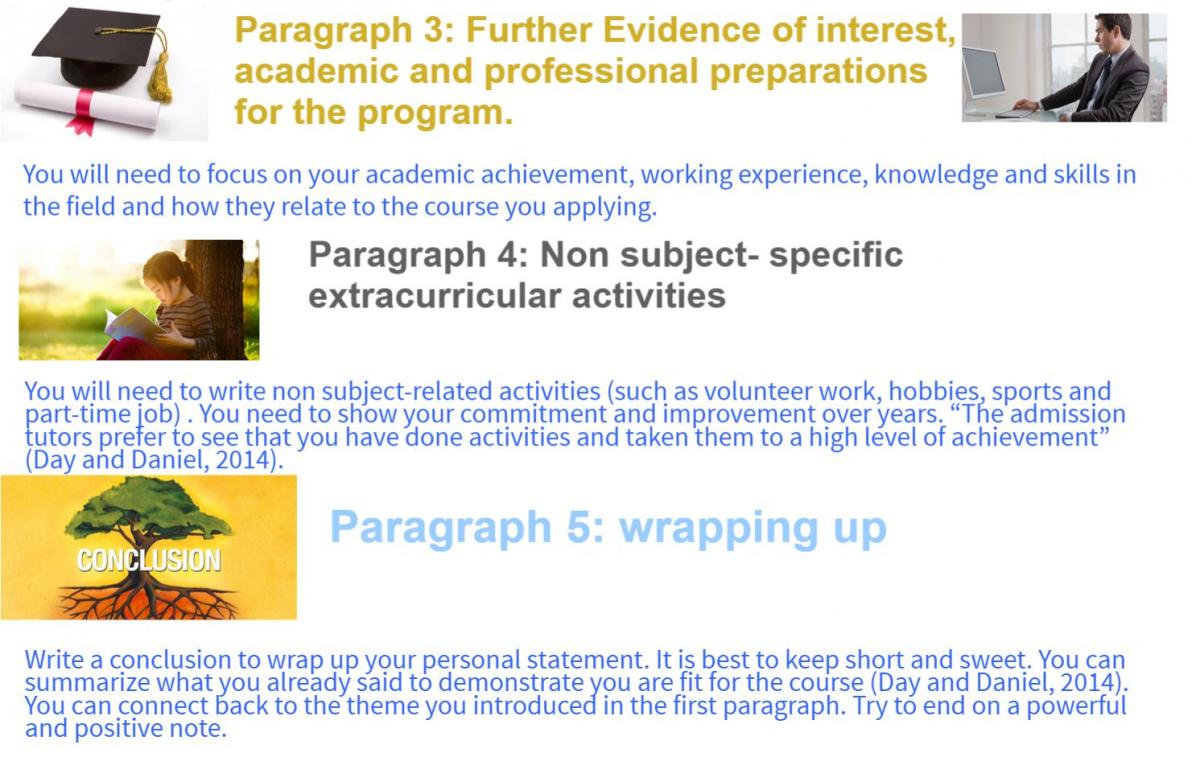How to Write a Personal Statement
How to Write a Personal Statement
Many students find that writing a personal statement is one of the most difficult parts of university application forms. Firstly, this article will show the main three areas that you need to cover in your personal statement. Secondly, it will explain the basic structure of a personal statement.
Introduction
“University is looking for good academic qualifications, a good reference and a good personal statement” (Oxford Brookes University, 2014). A good starting point is to decide the subject you want to study and course requirements.
We recommend that your personal statement covers three main areas in your personal statement.
Why do you want to study this subject? What have you done in the past that makes you particularly suitable to study the subject? What else have you done that would contribute to the course and the university community and makes you an interesting and unique individual? (Durham University, 2014)
Basic structure
We have given the basic structure of personal statement below. The personal statement can consist of five paragraphs (Day and Daniel, 2014).
Paragraph 1: Introduction to grab reader’s attention and Why this course.
In this paragraph, you need to show sustainable motivation to study your chosen course and explain why you want to study it.
Paragraph 2: Evidence of interest and aptitude for subject.
The aim of Paragraph 2 is to show your interest in subject and subject-specific further reading. You need to show evidence of your interest in your subject beyond your obligatory work. For example, you studied Business major as an undergraduate course but you want to apply for Master degree in Finance major. You will need to show why you are interesting in Finance and provide evidence of reading and understanding.
Paragraph 3: Further evidence of interest, academic and professional preparations for the programme.
You will need to focus on your academic achievements, working experience, knowledge and skills in the field and how they relate to the course you are applying for.
Paragraph 4: Non subject-specific extracurricular activities.
In this paragraph, you will need to write about non subject-related activities. You need to show your commitment and improvement over years. “The admission tutors prefer to see that you have done activities and taken them to a high level of achievement” (Day and Daniel, 2014).
Paragraph 5: Wrapping up.
Write a conclusion to wrap up your personal statement. It is best to keep it short and sweet. You can summarise what you already said to demonstrate that you are fit for the course (Day and Daniel, 2014). You can connect back to the theme you introduced in the first paragraph. Try to end on a powerful and positive note.
References
Day, G. and Daniel, G., (2014). Your UCAS Personal Statement for Business, Economics, Finance, Management & Accounting: What to write if you want to get in. Gwynday.com.
Durham University, (2014). How to write an effective personal statement. [Online] Available at: https://www.dur.ac.uk/resources/undergraduate/apply/personalstatement/pe... [Accessed 24 Feb. 2015].
Oxford Brookes University, (2014). Personal statements. [Online] Available at: http://www.brookes.ac.uk/documents/studying-at-brookes/school-and-colleg... [Accessed 24 Feb. 2015].









